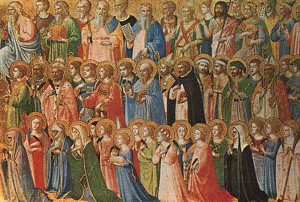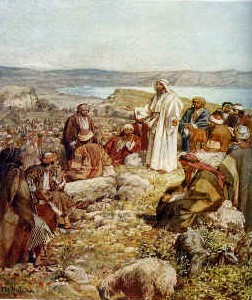SOLEMNITY OF ALL
SAINTS
(only text, to
print)
 We
celebrate today, brothers and sisters, one of the nicest celebrations of the whole
year: the Solemnity of All Saints. During the year we have seen several ways to
sanctify oneself. Today we go up to heaven and we contemplate a great multitude
of people who have really loved Jesus Christ and now enjoy the beatific vision.
We
celebrate today, brothers and sisters, one of the nicest celebrations of the whole
year: the Solemnity of All Saints. During the year we have seen several ways to
sanctify oneself. Today we go up to heaven and we contemplate a great multitude
of people who have really loved Jesus Christ and now enjoy the beatific vision.
In some
years, or perhaps soon, we will celebrate this solemnity in heaven, because we also
truly love Jesus Christ, in spite of our imperfections.
In the
celebration of All Saints we can see the success of Jesus Christ. Millions of
people have believed in Him, have accepted his message and have followed him;
and some to the point of shedding their blood in martyrdom. Saints are the best
fruit of Easter, and their happiness is the happiness of Christ himself.
We have heard in the first reading these words from the book of
Revelation: I had a vision of a great
multitude, which no one could count, from every nation, race, people, and
tongue. They stood before the throne and before the Lamb, wearing white robes
and holding palm branches in their hands. They cried out in a loud voice:
"Salvation comes from our God, who is seated on the throne, and from the
Lamb" (Rev 7:9-1).
Surely
our grandparents, brothers, sisters, parents or children, now enjoy the vision
of God, and today we celebrate their feast.
Saint Paul, in the letter to the Ephesians, says to us: He chose us in him, before the foundation
of the world, to be holy and without blemish before him. In love he destined us
for adoption to himself through Jesus Christ (Eph 1:4-5).
Jesus
says to us: Be perfect as your heavenly Father is perfect (Mt 5:48).
This is
the will of God: that all may be saved and enjoy eternal life.
WHAT DO WE UNDERSTAND A SAINT TO BE?
What does
sanctity consists in? Sanctity consists in living the Beatitudes we have read
today in the gospel.
To be
poor, to be humble, to be merciful, to fight for justice, to be a peace maker
and to suffer for the kingdom of Heaven.
This is
the program given by Jesus Christ and we, his followers, must follow it.
Saint Theresa
says to us that sanctity consists in a disposition of the heart, which causes
us to be humble and small in the arms of God. What a beautiful definition! To
put oneself in the arms of God!
NOW LET US LOOK AT THE PERSON OF JESUS CHRIST
Let us look
at the great figure of Jesus Christ, and, although very briefly, let us consider
how he lived out the beatitudes we have heard in the gospel. Let us also
consider how we, in our daily life, can put them into practice.
Blessed are the poor in spirit, for theirs is
the Kingdom of heaven (Mt 5.3)
Jesus was
born poor, was a worker, died poor on a cross and was buried in a tomb that was
not of his own, today we would say, of rent.
It is
possible for us to put into practice the poverty of spirit, giving up the
thirst for wealth which we all have inside.
Blessed are they who mourn, for they will be
comforted (Mt 5:4)
Jesus
cried when Lazarus, his friend, died; before the ingratitude of Jerusalem and
in the garden of Getsemany.
In our
life, more than once, we may have to wipe the tears of someone who cries for
the death of a relative, a mother, a son, or daughter; the tears of a drug
addict, or of a friend who goes through a bad moment in his affective life, in
his work or in his solitude.
 Blessed are the meek, for they will inherit the
land (Mt 5:5)
Blessed are the meek, for they will inherit the
land (Mt 5:5)
Jesus was
meek and humble of heart (MT 11.29). His meekness and humility attracted the
children, the sick and the afflicted.
We may
exert the virtue of humility and meekness, by overcoming the desire to insult,
or to despise the person who has not treated us in a correct way.
Blessed are they who hunger and thirst for
righteousness, for they will be satisfied (Mt 5:6)
Jesus was
hungry for the glory of his Father, and he forgot about material hunger,
because his food was to do the will of his Father. Recall the passage of the
Samaritan woman. My food is to do the
will of the one who sent me and to finish his work (Jhn 4:34).
Blessed are the merciful, for they will be shown
mercy (Mt 5:7)
Jesus was
merciful. He pardons the sinful woman, the adulteress and his enemies on the
cross: Father, forgive them, for they do not know what they are
doing.
He is the
merciful Father who waits for the return of his prodigal son.
We have
to be merciful in the we way we judge people, in learning to excuse, and in
trying to forget the offences we have received.
In the Our
Father, we say: Forgive us our offences,
as we forgive those who have offended us (Mt 6:12).
Blessed are the clean of heart, for they will
see God (Mt 5:8)
Jesus was
clean of heart. He asks: who will accuse
to me of sin? He was innocence personified: Can any of you charge me with sin? (Jhn 8:46).
When we badly judge the behavior of a person who has
offended us, we always have to verify if our heart, our glance, our words and
attitudes are clean, not to condemn, or to see second intentions, where there
is only human weakness. Often it hurts us when we are offended, and for that
reason we too often give an offensive irritated answer.
Blessed are the peacemakers, for they will be
called children of God (Mt 5:9)
Jesus was
the Peace sang by the angels and that Peace which he wished for us before going
away: Peace I leave with you; my
peace I give to you. Not as the world gives do I give it to you. Do not let
your hearts be troubled or afraid (Jhn 14:27).
It is
possible that more than once we will have to repress and to silence the wrath
that arises in our interior, as well as the bad thoughts that come to us. To
bring peace to our heart, to the families and to society, this has to be our
Christian ideal.
Blessed are they who are persecuted for the sake
of righteousness, for theirs is the Kingdom of heaven (Mt 5:10)
Jesus was
persecuted for the sake of righteousness and died on a cross.
If Jesus
was persecuted, we, his disciples, will also be, if we want to live a truly Christian
life.
No slave is greater than his master. If they
persecuted me, they will also persecute you (Jhn 15:20).
Thus, up
to here, a few examples, and we could add many more.
To venerate, not to worship the saints
We
venerate (we do not worship) the saints
because they are our intercessors before God, and we ask them to present our
pleas to the Lord.
It is
good to pray to the saints when we are in need, but is better to imitate their
love for Jesus Christ, so that we may one day join them in heaven.
The
preface of the Solemnity of All Saints says thus:
Their glory fills
us with joy, and their communion with us in your Church gives us inspiration
and strength as we hasten on our pilgrimage of faith, eager to meet them.
Consider that the way that
leads to heaven is the way of the Beatitudes. Let us follow it, and we will all
meet above in heaven, with our relatives who have preceded us with the sign of
the Cross and now rest in peace.
Nothing
else. My wish for all of you is that we will all meet together in heaven,
enjoying the presence of the Father, the Son and the Holy Spirit, of Mary, the
mother of Jesus, and of all the saints, singing praises to the Creator.
May you
have a good All Saints day.
Thoughts
on Prayer
1. It is
to open our heart to that Person whom we know loves us.
2. It is
to engage in a dialog with God, to talk with him.
3. It is
to listen to God: "Speak Lord, your servant is listening".
4. It is
to let God tell me that He loves me.
5. It is
to present to God our poverty, so that He may fill us with his wealth.
6. It is
to get to be in time, that which every
one of us is in the mind of God from the beginning. "It is no longer I who lives, but Christ who lives in me", says
Saint Paul.
7. It is
to breathe spiritually.
8. It is
to become aware of being nothing, before Him who is everything.
9. It is
to accept that He fills me, penetrates all my being, to the point of being one with
Him.